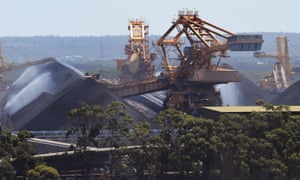Australia's Coral Reefs Under Threat From Climate Change
DOWNLOAD THE REPORT
KEY FINDINGS:
1) The longest global
coral bleaching event on record is underway due to record breaking ocean
temperatures driven by climate change and El Niño.
2)
Coral reefs are among the most biologically diverse and economically
valuable ecosystems on Earth, but they are under threat from climate
change.
3)
The future of coral reefs around the world depends on how much and how
fast we reduce greenhouse gas emissions now and in the coming years and decades.
|
The comprehensive report, reviewed by international experts, found that rising global ocean temperatures, driven by climate change, has been the cause of an extremely severe bleaching event.
This event has affected 93% of individual reefs and many reefs in the north have been bleached for the first time.
At present rates of climate change, this level of bleaching could occur every two years by the mid 2030s and the world's coral reefs are unlikely to be able to cope.
"Recently, we have seen some serious smoke and mirrors about the ability of the reef to recover," report author Professor Will Steffen said.
"The fact is, as bleaching events get closer together and more severe, reefs will struggle to survive.
"Some parts of the reef currently experiencing bleaching may be able to recover, provided that they are not repeatedly and frequently bleached in the future. This is why tackling climate change is critical to the long-term future of the reef.
"Depending on how quickly the record-breaking ocean temperatures wane, the reef may be able to partly heal in some areas in the short-term. But in the long-term, the reef's capacity to recover will depend on how much and how fast we reduce our greenhouse gas emissions in the next few years.
"Recovery could be impossible for many of the reefs currently affected if climate change is not arrested."
 |
| Professor Will Steffen |
Global emissions must be trending down by 2020 at the latest to save the world's coral reefs. While countries like the US are now reducing their emissions, Australia's are rising.
"We are more than halfway through the critical decade for action to stabilise the climate and reduce the risks of climate change. Scientists have been warning the world about the risks from climate change for more than 30 years. Now it is crunch time," co-author Professor Lesley Hughes said.
"The window to limit global warming and preserve Australia's coral reefs is running out.
"The decisions made in the next federal term of government and the current term of the Queensland government will be critical to the long-term survival of the reef."
"It is vitally important that Australia plays its part in global efforts to tackle climate change."
Professor Hughes said attempts to improve water quality on the Great Barrier Reef will be in vain without action on climate change.
"The bottom line is that water quality improvements, though welcome, will not save the Great Barrier Reef. The only way to do that is to rapidly transition our energy systems away from polluting fossil fuels towards modern, clean renewables," she said.
Links


